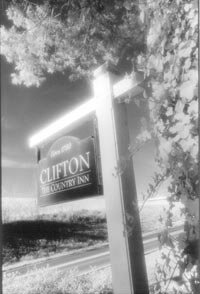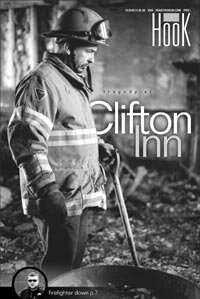Clifton-hanger: Inn reopens as lawyers press claims
On Thursday, February 10– nearly 15 months after a deadly blaze killed two law school recruiters and injured a third– Clifton Inn celebrated its reopening. But while tourists are now eagerly making overnight reservations for the luxury accommodations and diners are lining up to enjoy gourmet meals from the chef's menu, three civil suits filed by the victims are marching toward an August hearing in federal court.
And for one of the lawyers pressing the claims, Clifton's defense amounts to a "scorched-earth" approach that has included suing one of the survivors– plus a candle-maker.
Prior to the fateful morning of November 14, 2003, the historic inn was known for its luxury features including high speed Internet access, flat screen televisions, and CD libraries in each room. Inn spokesperson Jessica Sheffield says all of those accoutrements have been retained, and the safety features have been improved to include smoke detectors in each room and a state-of-the-art fire alarm system that reports directly to the fire department.
But Charlottesville attorney Matthew Murray is irked by Clifton's enthusiastic celebration. He says he was particularly incensed to see laughing Clifton executives in a recent Daily Progress photo heralding the opening.
"They haven't cleaned up the mess that they left from the fire," says Murray, who represents Gerald Langlade, widower of Trish Langlade, one of the two women who died in the fire.
Clifton general manager J.F. Legault declines comment on the lawsuits, but he defends the reopening, which he says was a "quiet event" to thank members of the community who have supported Clifton.
"The Clifton family continues to hold the events of November 14 in our hearts," says Legault, "and our hearts continue to go out to the families that were affected by this. Those events will be with us forever."
According to the fire marshal's report on the incident, the New York-based firm of Willkie Farr & Gallagher held a recruiting dinner at the Inn on November 13. A wind storm had disrupted power, and employees had used candles to provide light.
Following the dinner, Langlade and her Willkie Farr colleagues Billie Kelly and William Grant headed to the drawing room where, according to the report, they continued to order drinks until the last employee left the building around midnight.
Sometime before dawn, a fire started in the first floor drawing room and quickly spread smoke and carbon monoxide into guest rooms. The two women, Langlade and Kelly, both perished in Langlade's second floor room from carbon monoxide poisoning. Grant, who the report says had been locked out of his room in an outbuilding, was sleeping in Kelly's room. He escaped out a window onto the roof of the veranda and was eventually rescued by another guest who had found a ladder.
On the first floor, in a room adjacent to the drawing room, Margaret Mansouri, a 2002 UVA Law grad also with Willkie Farr, was rescued unconscious and hospitalized for smoke inhalation.
The fire marshal ruled the fire accidental without ever pinpointing the exact cause, and no criminal charges were files.
"While it was a tragedy," says Albemarle Commonwealth's Attorney Jim Camblos, "it wasn't anything that rises to the level of criminal activity."
But the three civil suits claim that the historic ambience– namely, candles and fireplaces left unattended– combined with inadequate safety measures, was likely to blame.
The suit filed by the family of Langlade asks for $10 million; Kelly's seeks $20 million; Mansouri is seeking $1 million in compensatory damages. The three suits have been "consolidated" in the federal court and will be heard beginning August 15.
The basis for the claims: "negligence." Clifton, the suits allege, failed its guests in numerous ways. Among them: having no overnight staff onsite; having malfunctioning smoke detectors; having second-floor windows painted shut; and having a malfunctioning fire alarm system that Murray says "gave a false impression of security."
The report shows that the smoke detectors in both Langlade's and Kelly's rooms didn't have batteries. Further, says Murray, none of the fire extinguishers had current inspections, and none of the rooms had an evacuation plan.
Whether these things could have saved Langlade and Kelly will never be known, but the report offers several chilling details about their final minutes.
While guest Justus Anderson and his wife escaped from their room, Anderson says he heard a woman yelling, "How do I get out of here?" According to the report, "he believes it was coming from upstairs," where Langlade and Kelly were later found.
The fire marshal's report also suggests Langlade and Kelly may have tried to escape. "There was heavy soot in the room," wrote investigator James Barber. "I also noticed handprints in the soot that went across the walls and ceiling. It appeared that someone was feeling their way around the room and had tried to open these windows."
From Kelly's second floor room, opposite Langlade's, Grant says he heard only a "faint beeping in the distance," and when he smelled smoke he "looked for a flashlight and eventually found the door." When he opened the door, however, "he was knocked back by heat and smoke."
Joseph Moore of Richmond-based Morris & Morris, which has been hired to represent the Inn, says his firm "generally does not comment on this kind of thing." But some defense tactics are revealed in three lawsuits Clifton fired off.
One blames Charlottesville-based Landmark Restoration for painting windows shut, which the suit claims amounts to "breach of contract."
The phone number listed for Landmark's agent, Karl Modery, has been disconnected, and no new listing is available. According to Murray, Modery is acting as his own counsel.
The suit over the candles pits Clifton against upscale New Jersey-based candle-maker Vance Kitira International, which Clifton claims provided candles used in the Inn the night of the fire.
Clifton's "breach of contract" suit against the candle-maker alleges that the warning accompanying the candles was "deficient" and "failed to comply with safety and/or industry standards." In addition, the suit claims "products liability" for "defective manufacture and design" and "defective warning." Vance Kitira president Doug Rickert declined comment but Murray is not buying Clifton's claim.
"Those candles did what they were supposed to do," he says. "They burned."
However, it was Clifton's final third-party suit that had Murray crying foul. That suit pointed the finger at Grant, who, the suit alleged, had "assumed the duties to monitor and/or extinguish the candles and care for the fire in the fireplace." The suit claimed he "breached" these duties.
According to the fire marshal's report, Grant, Langlade, and Kelly had been ordering drinks throughout the night. Langlade's blood alcohol measured .09 (.01 above the legal driving limit) after her death at approximately 5:30am. Kelly's blood alcohol measured .01 at the same time following her death. In the report, Grant admits he had as many as seven drinks over the course of the evening, and recalls blowing out candles in the drawing room before going to bed. He declines comment on the case.
Clifton has since dropped the suit against Grant, and Murray wishes the Inn would drop the other suits and settle with the victims so all parties can move on.
"We have four children and two husbands who cannot get closure on the death of mom and wife because we have a frivolous defense," he says. "I can't for the life of me understand their motivation."

PHOTO BY JEN FARIELLO

The Clifton fire was the subject of the November 23, 2003 Hook cover story.
#